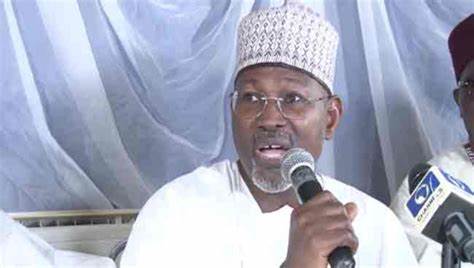Published
11 months agoon

Many of the prevailing national security challenges in Nigeria are on account of poor management of complex diversity and poor governance, complicated by heightened mobilization of ethno-religious identities, especially political and electoral contestations. Thus, communal, ethno-religious, and even farmer-herder conflicts belong to this category of conflicts, Attahiru M. Jega, PhD Department of Political Science, Bayero University, Kano, Nigeria has said.
Prof. Jega made this known in a keynote address at the Inaugural Lecture, organized in honour of Rt. Hon. Umaru Bago Mohammed, the Governor-elect, Niger State, at the Justice Idris Legbo Kutigi International Conference Centre, Minna, Niger State. He categorically stated that weak institutional framework for policing and general security provisioning, as well as pervasive corruption in the judiciary have all combined to heighten these security challenges.
“Since 2009, however, relatively newer challenges have emerged with more damaging consequences on peaceful coexistence in the country, such as the Boko Haram insurgency, militancy in the Niger Delta, IPOB irredentism in the Southeast, and cattle rustling, kidnapping for ransom in virtually all parts of the country, and banditry in the Northwest geopolitical zone. The number of recorded deaths from Boko Haram insurgency and kidnappings alone, rose from 4,633 in 2017, to 6565 in 2018, to 8340 in 2019, and 9,694 in 2020 (EONS Intelligence)”.
He further pointed that “While the Buhari government has claimed to have degraded Boko Haram, the inability to totally defeat their insurgency, as well as sufficiently contain the other dimensions of insecurity, which have emerged and flourished, further highlighted the crisis of governance, the collapse of the national security architecture, and the increasing failure of the state to discharge one of its main constitutional responsibility, of protecting lives and property and securing the citizens”.
At this stage of our national democratic development, given the nature and character of the Nigerian state (as manifested at all levels, federal, state and local), bedeviled as it has been by a ‘depressed’ economy and systemic security challenges, and the disposition of its ruling elite, who have basically, generally preoccupied themselves with the pursuit of their self-serving objectives, it is indeed necessary to discuss how best to reposition the political economy towards democratic development predicated on good, democratic governance”.
Nigeria needs to reposition its democratic development away from the notion of mere “good governance”, towards the more substantive and desirable notion of good democratic governance. The protection, defence and promotion of citizenship rights and citizens’ human dignity and human security, should be the main purpose of governance, and the overriding activity of government, presided over or led by representatives carefully chosen and mandated by the citizens, through their active participation in elections that have credibility and integrity; elected representatives who are responsible and responsive to the needs and aspirations of those who elected them.







